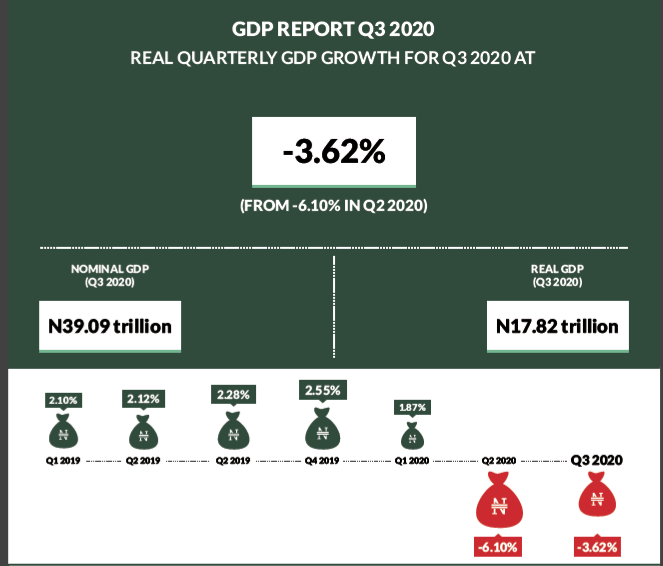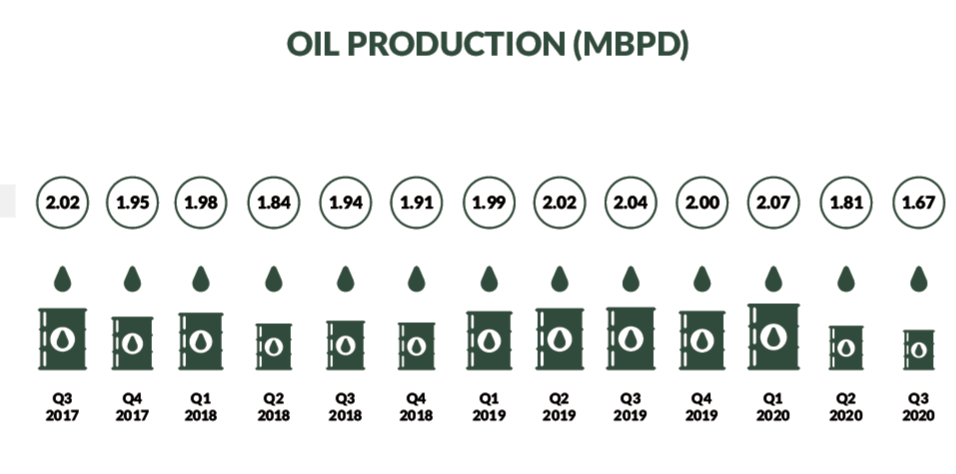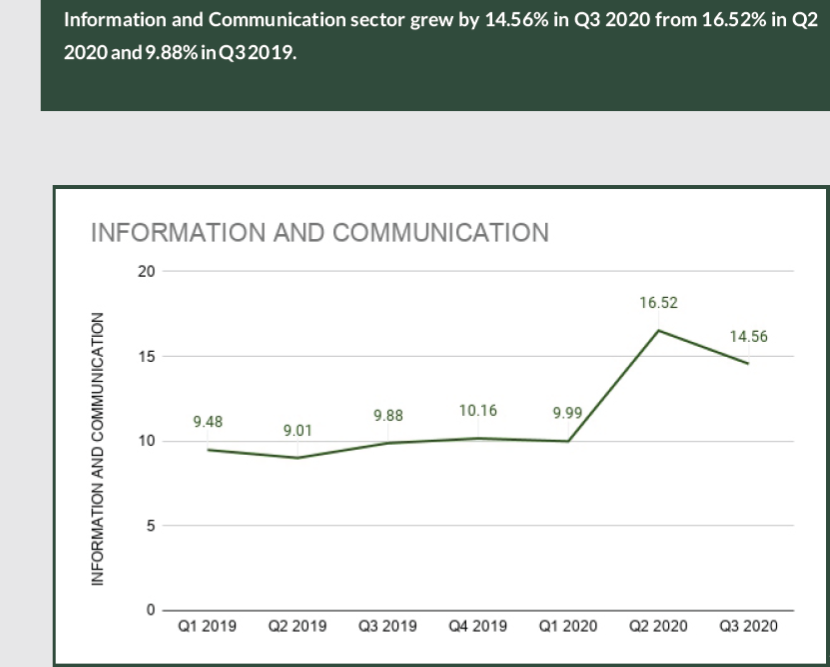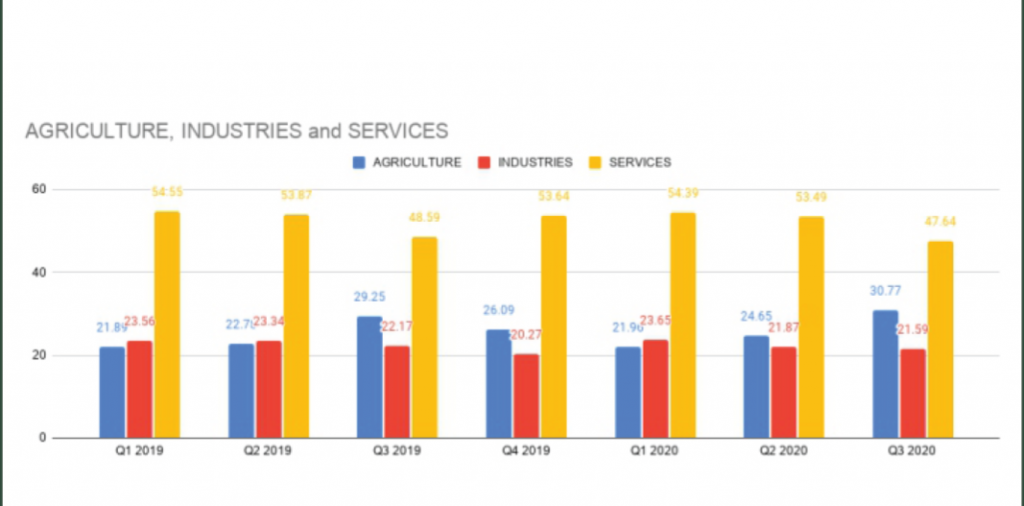The Nigerian economy has slipped into a second recession in 5 years, culminating months of economic difficulties caused by the coronavirus pandemic.
The country’s GDP declined 3.62% in the third quarter of 2020, according to the latest GDP report by the National Bureau of Statistics. This is the second consecutive quarterly drop in GDP after the country declined by 6.10% in the second quarter of the year.
Recession occurs when a country’s economy declines for two consecutive quarters. If recession lasts long enough, it turns into depression.


Despite the slight Quarter on Quarter growth, the report shows that the country has entered into a recession, it’s second since the 2016 recession caused by Crude Oil Crash.
Falling Oil Revenue
Similar to the 2016 recession, the average daily oil production recorded in the third quarter of 2020 has dropped significantly. The oil output stood at 1.67 million barrels per day (mbpd), just shy of the decade low of 1.61 mbpd recorded in 2016.
Consequently, the sector contributed 8.73% of the total real GDP in Q3 2020, down from 9.77% recorded in the corresponding period of 2019 and 8.93% recorded in the Q2 2020.
Asides oil, other sectors still felt the residual effects of the restrictions on movement and economic activity implemented across the country in early Q2 in response to the COVID-19.
However, recovery signs are strong as a total of 18 economic activities recorded positive growth in Q3 2020, compared to 13 activities in Q2 2020.


Suggested read: Nigerian Startups Responsible for 97.9% of $1.8bn Raised by W/African Startups in the Last 10yrs
ICT (Services) becomes highest contributor
ICT has become one of the strongest contributors to the GDP since the beginning of the year, exceeding the contributions of the oil sector in the last two quarters.
According to the report, ICT recorded about N5.26 trillion during the quarter. This represents a 15.91% increase from what was recorded during the same period last year and 17.06% higher than the rate recorded in the preceding quarter.
Of total real GDP, the sector accounted for 13.47% during the quarter but its contribution was higher in Q2 at 17.83%.
The growth the country’s ICT sector has been one of the most significant and shows the prospect to become a greater contributor to the Nigerian economy.


Can Technology save the Nigerian Economy?
When an economy grows, citizens do well and get richer. They also have jobs, good salaries, and improved quality of life. However, when economic growth slows or declines, it translates to a shortage of money, lack and loss of jobs, and salary cuts by companies
This recession comes at a time when life is tough for Nigerians and poverty is at an all-time high due to the effects of the pandemic
The period of recession not only causes a rise in poverty and inequality among citizens it also puts the government at a disadvantage as revenue shortage can stall public services and projects.
With Nigeria’s pride commodity, Crude oil no longer able to float the economy, technology drive shows a possibility of helping the country survive. According to the West African Startup Decade Report by Techpoint Africa, tech companies in Nigeria contributed 97.9% Of the $1.806 billion funds raised by Millionaire West African Startups (MWAS) between 2010 and 2019.
The reports also show significant investment across other sectors through tech with the e-commerce sector seeing almost 60% of the funding. Sectors like Agriculture which contributed about 21.96% of the GDP saw significant funding through Agrotech companies like Requid, Thrive Agric and Farmcrowdy etc.
Nigeria’s GDP in the third quarter of 2020 stood at N39 trillion, the largest in Africa.
Similarly, advancement in AI and machine learning which has helped improve factory and Industries could also add to the 23.65% the sector contributes to the GDP.
Services which cover other sectors like health care, media and entertainment, logistics etc will over time also contribute more to the countries GDP.
Suggested read: NCC Provided N362.3Bn of the N31.86Tn Telecoms Contribution to Nigeria’s GDP in the Last 5 Years


What can Nigeria do?
There are several ways the government can address the current recession. Most countries however often turn to monetary and fiscal measures.
They use monetary policies to modify interest rate, buy or sell government bonds, regulate foreign exchange rates, and change the amount of money banks should maintain as reserves. By reducing interest rates, businesses can take loans on convenient terms to expand productive activities, hire, pay and generally spend more.
The current global economic depression is the worst in almost four decades.
Another strategy is to lower taxes so that people will have more money to spend and invest. Then the spending leads companies to hire and pay more, and boost economic activities.
However, the government has chosen to impose an array of taxes and charges on citizens, from higher VAT to fuel and electricity prices hike at a time of economic difficulties. Thus while the government is expected to get richer, its citizens would get poorer and suffer the brunt of the current situation.
In Summary, what Nigeria needs is more spending on technology and innovations and lower taxes to help people cope with the increasing prices of goods and services in the country.






